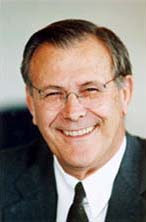 Scholars See a Broad Pattern of Deception by U.S. Military Pentagon Liars Think They're Working for Nation's Good |
|
Compiled by GayToday
Theodore Postol, Professor of Science, Technology and National Security Policy at MIT, and a former scientific advisor to the Chief of Naval Operations, told researchers at the Center for the Study of Sexual Minorities in the Military at the University of California, Santa Barbara that it can be difficult to distinguish between justified and unjustified deception. "I think the problem we see a lot in the Pentagon these days," he said, "is that many people have the sense that what they are doing is for the good of the country and therefore it's justified to lie. "That extends to budgets, performance of weapons systems, and so on. It's not unlike a group of clubby people who try to protect each other but convince themselves they're acting for the greater good." Congressional investigations in recent years determined that tests of antimissile weaponry conducted in 1991 and 1984 were rigged to produce successful results. In 2000, CBS News raised allegations of fraud in antimissile testing. The previous fall, leaders of the Ballistic Missile Defense Organization, a Defense Department program, claimed success in a critical test of anti-missile weapons systems, shortly before President Clinton was to determine whether to renew funding for the project. According to the New York Times, officials acknowledged serious problems with the test only after reporters raised questions, forcing them to re-interpret the results in ways that conflicted with earlier statements. Colonel Daniel Smith, Chief of Research at the Center for Defense Information, said that wartime disinformation is "standard policy and has been for centuries." Where problems arise, he said, is "when the propaganda becomes so inflammatory that it creates a backlash in our own country." He said that in recent weeks, "we've seen a growing questioning and an air of disinclination to take the Pentagon's accounts at face value." He added that the insistence that missile defense systems were successful was a "form of manipulation" through "omission" for the specific purpose of national defense, though he stopped short of calling it lying. Don't Ask, Don't Tell
Aaron Belkin, Director of CSSMM, said that the Pentagon has routinely suppressed information that it deemed detrimental to its objectives. He cited several studies that the Defense Department commissioned on gay soldiers, only to bury or dismiss findings when conclusions threatened to invalidate official policies. In 1993, the Defense Department commissioned a study on how to lift the ban on gays in uniform. The study was conducted by a Pentagon creation, the Rand Corporation's National Defense Research Institute. Rand's report concluded that gays could serve openly without disrupting military effectiveness. But when the conclusions were released internally to Pentagon officials, according to the New York Times, military leaders ordered that the study be kept from the public, and refused to discuss it. In 1989, a Defense Department research center concluded a report recommending reconsideration of the ban on homosexual servicemembers. When the conclusions found no appreciable security risk and, in fact, no reason for the gay ban at all, senior officials again suppressed their own study, saying in internal Pentagon correspondence that it exceeded its mandate and was "not responsive to the original research request." Officials in the office of the secretary of defense labeled the report a "draft" so it would not have to be released to the public, and ordered a new version of the study more narrowly defining the questions they wanted asked. Former Congressman Gerry Studs reportedly called the Pentagon to ask for a copy of the report, and was told that "no such report exists." It was not until a copy was anonymously leaked to members of Congress, who then passed it on to the press, that the public was able to see the original findings. According to the Wall Street Journal, a spokesman for the Department of Defense said during the Gulf War that the military's policy of discharging gay soldiers would not change; anyone found to be gay or lesbian would be separated from the military service. But several reservists reported that, after telling their commanding officers they were homosexual, they were told that they would be sent to the Persian Gulf but discharged upon their return. "At a time when the White House and Pentagon are asking the American people to put extraordinary trust in their leaders," said Belkin, "when they are asking for political and economic support beyond what most Americans are used to, military policies that depend on deception can only erode faith in the government." |


